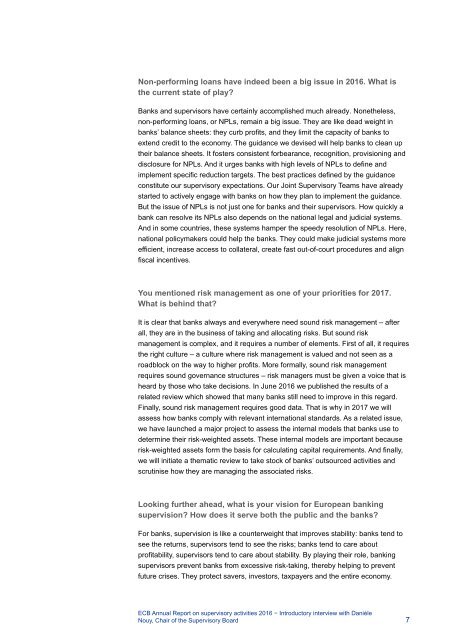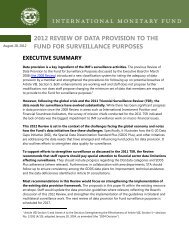ECB Annual Report on supervisory activities
ssmar2016.en.pdf?utm_source=POLITICO.EU&utm_campaign=b1bb431652-EMAIL_CAMPAIGN_2017_03_23&utm_medium=email&utm_term=0_10959edeb5-b1bb431652-189797857&utm_source=POLITICO
ssmar2016.en.pdf?utm_source=POLITICO.EU&utm_campaign=b1bb431652-EMAIL_CAMPAIGN_2017_03_23&utm_medium=email&utm_term=0_10959edeb5-b1bb431652-189797857&utm_source=POLITICO
You also want an ePaper? Increase the reach of your titles
YUMPU automatically turns print PDFs into web optimized ePapers that Google loves.
N<strong>on</strong>-performing loans have indeed been a big issue in 2016. What is<br />
the current state of play?<br />
Banks and supervisors have certainly accomplished much already. N<strong>on</strong>etheless,<br />
n<strong>on</strong>-performing loans, or NPLs, remain a big issue. They are like dead weight in<br />
banks’ balance sheets: they curb profits, and they limit the capacity of banks to<br />
extend credit to the ec<strong>on</strong>omy. The guidance we devised will help banks to clean up<br />
their balance sheets. It fosters c<strong>on</strong>sistent forbearance, recogniti<strong>on</strong>, provisi<strong>on</strong>ing and<br />
disclosure for NPLs. And it urges banks with high levels of NPLs to define and<br />
implement specific reducti<strong>on</strong> targets. The best practices defined by the guidance<br />
c<strong>on</strong>stitute our <strong>supervisory</strong> expectati<strong>on</strong>s. Our Joint Supervisory Teams have already<br />
started to actively engage with banks <strong>on</strong> how they plan to implement the guidance.<br />
But the issue of NPLs is not just <strong>on</strong>e for banks and their supervisors. How quickly a<br />
bank can resolve its NPLs also depends <strong>on</strong> the nati<strong>on</strong>al legal and judicial systems.<br />
And in some countries, these systems hamper the speedy resoluti<strong>on</strong> of NPLs. Here,<br />
nati<strong>on</strong>al policymakers could help the banks. They could make judicial systems more<br />
efficient, increase access to collateral, create fast out-of-court procedures and align<br />
fiscal incentives.<br />
You menti<strong>on</strong>ed risk management as <strong>on</strong>e of your priorities for 2017.<br />
What is behind that?<br />
It is clear that banks always and everywhere need sound risk management – after<br />
all, they are in the business of taking and allocating risks. But sound risk<br />
management is complex, and it requires a number of elements. First of all, it requires<br />
the right culture – a culture where risk management is valued and not seen as a<br />
roadblock <strong>on</strong> the way to higher profits. More formally, sound risk management<br />
requires sound governance structures – risk managers must be given a voice that is<br />
heard by those who take decisi<strong>on</strong>s. In June 2016 we published the results of a<br />
related review which showed that many banks still need to improve in this regard.<br />
Finally, sound risk management requires good data. That is why in 2017 we will<br />
assess how banks comply with relevant internati<strong>on</strong>al standards. As a related issue,<br />
we have launched a major project to assess the internal models that banks use to<br />
determine their risk-weighted assets. These internal models are important because<br />
risk-weighted assets form the basis for calculating capital requirements. And finally,<br />
we will initiate a thematic review to take stock of banks’ outsourced <strong>activities</strong> and<br />
scrutinise how they are managing the associated risks.<br />
Looking further ahead, what is your visi<strong>on</strong> for European banking<br />
supervisi<strong>on</strong>? How does it serve both the public and the banks?<br />
For banks, supervisi<strong>on</strong> is like a counterweight that improves stability: banks tend to<br />
see the returns, supervisors tend to see the risks; banks tend to care about<br />
profitability, supervisors tend to care about stability. By playing their role, banking<br />
supervisors prevent banks from excessive risk-taking, thereby helping to prevent<br />
future crises. They protect savers, investors, taxpayers and the entire ec<strong>on</strong>omy.<br />
<str<strong>on</strong>g>ECB</str<strong>on</strong>g> <str<strong>on</strong>g>Annual</str<strong>on</strong>g> <str<strong>on</strong>g>Report</str<strong>on</strong>g> <strong>on</strong> <strong>supervisory</strong> <strong>activities</strong> 2016 − Introductory interview with Danièle<br />
Nouy, Chair of the Supervisory Board 7



